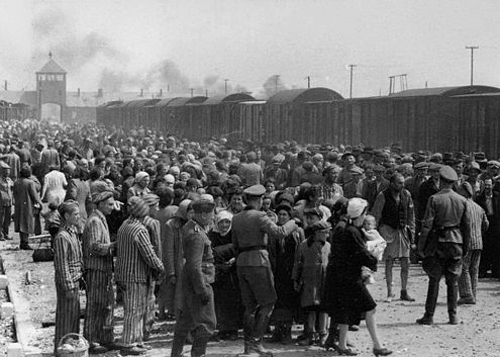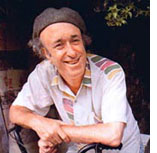
71 years later, Bergen- Belsen survivors reunite in New York City
By Dan Bloom

CHIAYI CITY, Taiwan –Two Holocaust survivors, one who made his home in Ireland after the war and the other who made his home in New York, met for the first time face to face in a heartfelt ”reunion” in Manhattan on October 28, even though they had spoken to each other by phone and email last March after a San Diego Jewish World reporter arranged their initial Internet communications. The stories are important ones.
When the Irish Central online newspaper picked up a San Diego Jewish World story about Peter Kubicek in and Tomi Reichental, the news spread worldwide via social media about these two amazing men and their happy, contented lives in 2015, despite having seen the Nazi evil close and personal in 1944 when they were teenagers. The Irish Central news article was headlined ”Two Holocaust survivors, one in Ireland, find they were on the same train to Bergen-Belsen.”
“Both men now believe they may have been in the same train car on their horrific journey to the Nazi concentration camp Bergen-Belsen,” Irish Central reported.
“Through an amazing series of events [Kubicek has been] reunited with Tomi Reichental, an Irish citizen who lives in Dublin and is also a Holocaust survivor from the same village in Slovakia,” the Irish online site wrote, adding this poignant note:
”They both realized they were very likely on the same cattle car that took them to that notorious concentration camp.”
Hoping to meet one day in New York, the dream came true on a beautiful autumn day in upper Manhattan when Kubicek, 85, and Reichental, 81, were guests of honor at a college symposium on the Holocaust at the College of Mount Saint Vincent.
Reichental flew in to New York from Dublin with his wife Joyce to have dinner with Kubicek and his wife Edith, at a celebratory dinner arranged by Irish film director Gerry Gregg and Joe Skelly, a history professor at the college. He said the purpose of his trip also was “to publicize my film produced by Irish documentary producer Gerry Gregg titled Close to Evil which received the Irish Film and Television Academy Award for ‘Best Single Documentary 2015.’ We showed clips of the film in Boston and New York and a full showing at a Long Island event with discussion and Q/A. The events were attended to full capacity with standing ovations.”
Further, he confided in an email, “It was a memorable meeting and practically 71 years to the day that we were dumped into the cattle cart on the way to Bergen Belsen. We thank you for the publicity of the event, it all helps to remind and not to forget the Holocaust.”
“The reunion seventy-one years after their forlorn train journey to Bergen-Belsen was a profound and unforgettable experience for everyone in the audience — students, faculty members, and friends
of Tomi and Peter,” Skelly told San Diego Jewish World by email after the event.
“These two men are moral witnesses to the reality of evil and inspiring examples of the resiliency of the human spirit,” he said. “They shared their experiences at the afternoon symposium in a way that left an indelible imprint on the consciences of all of those in attendance. Their words will echo in the memories of the college students in the audience, who will now bear witness for future generations to the horror of the Holocaust and the determination of brave souls like Tomi and Peter to defeat evil in our time.”
For Kubicek, the reunion with Reichental cemented their online friendship that began in March.
“The college symposium took place in a conference room, with an audience which was composed of faculty and students,” Kubicek told this reporter. “At one point I was handed the microphone and asked to speak. While I had nothing whatever prepared, I am never at a loss for words, particularly when it comes to the Holocaust — a topic about which I know a lot and about which I have strong opinions.”
“After the event, Professor Skelly took our small group out to dinner at — get this! — a glatt kosher local restaurant,” he added.
In March, struck by the parallels between these strangers’ lives and a desire to bring them together, San Diego Jewish World ran a preliminary story about the two men, based on an earlier New York Times story about Reichental from its Dublin bureau and a series of emails to this on-line publication from Kubicek.
Reichental, after reading the story here at the San Diego Jewish World website, said in email that he was interested in contacting Kubicek.
“I am writing to you as I would like to get the email address of Peter Kubicek. I go sometimes to New York, too, so it might be a possibility to meet Peter some day in person.”
After the Irish Central reporter Frances Mulaney picked up our story, Kubicek was interviewed and quoted as saying: “I was very surprised to hear from Tomi. We compared notes and I suspected that we we were on the same cattle car transport from the Slovak concentration camp of Serad to Bergen-Belsen in November 1944 which was the first transport that went there instead of Poland. He confirmed that that was the one.”
In an email to Kubicek, Reichental wrote, “It was the second of November, 1944, when we were deported from Sered and we arrived seven days later at Bergen-Belsen. It was the first transport from Slovakia with children, mothers and the elderly that didn’t go to Birkenau because the gas chambers were blown up by the Germans on the seventh of November due to the advancing Russians towards the camp.”
“We were in the cattle cart traveling at the time and must have been diverted to Bergen-Belsen. We lived in block 207.”
“It’s an amazing thing – the people who were in Bergen-Belsen–it’s an amazing feeling to meet somebody that has that connection. That’s what sort of connected us, there was nothing else, but when you meet someone who has also lived through horrific times. It makes us special and we have an affinity to each other because we were in the same place, which was a horrific experience,” Reichental told Mulraney in New York.
Reichental gives talks and lectures on the Holocaust in schools throughout Ireland. Kubicek gives talks as well in New York, where he works as a docent at the Metropolitan Museum of Art. Age hasn’t slowed these gentlemen down.
“It is the last chance. We are the last witnesses to this horrific crime that happened not long ago, and to speak against those people who are trying to deny the Holocaust,” Reichental says. “I spoke to 72,000 students in Ireland and I think they tell their parents and friends and my story reaches hundreds and thousands.
“It is important for me. I owe it to the victims,” he said. “I lost thirty-five members of my family and it’s very important that we speak to young people– that they hear the story and tell their children that they met a Holocaust survivor.”
“It’s not easy – reliving my past – I started to lecture 11 years ago. I didn’t speak about it for 55 years before this and when I first started it was hard,” he added.
Kubicek published his own memoir, Memories of Evil: A World War II Childhood, in 2012.
“Tomi mentioned in an email to me that for many years he didn’t talk about it and that is true of many of the rest of us too. They talk now of post traumatic stress disorder (PTSD) and that’s certainly what we were all suffering from,” he told Irish Central last March. “It took us all a long time to live with our memories, but I found that once I started writing it was like I was starting catharsis, like a boulder fell from my back and the process was almost therapeutic.”
*
Bloom, based in Taiwan, is an inveterate web surfer and email correspondent. He may be contacted via dan.bloom@sdjewishworld.com